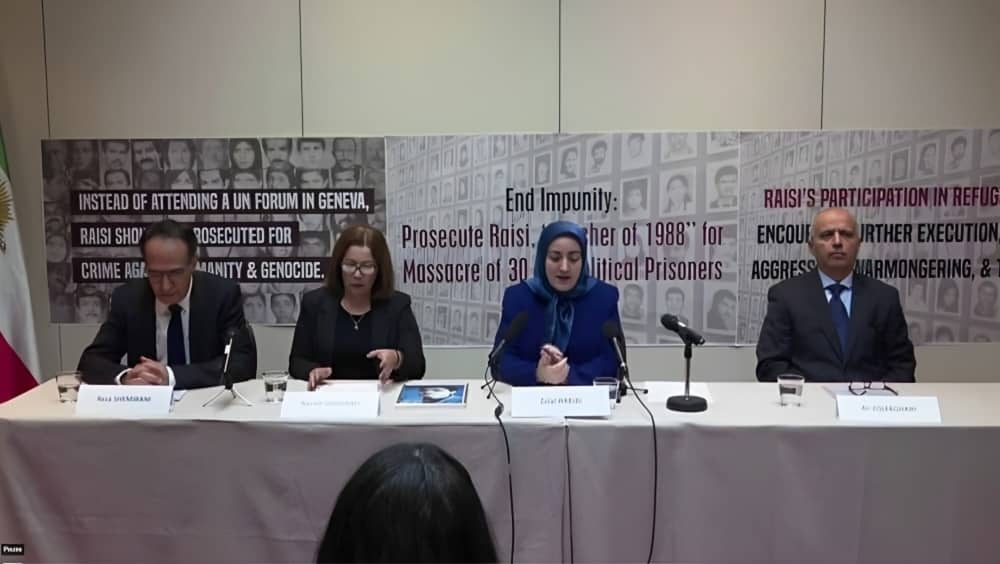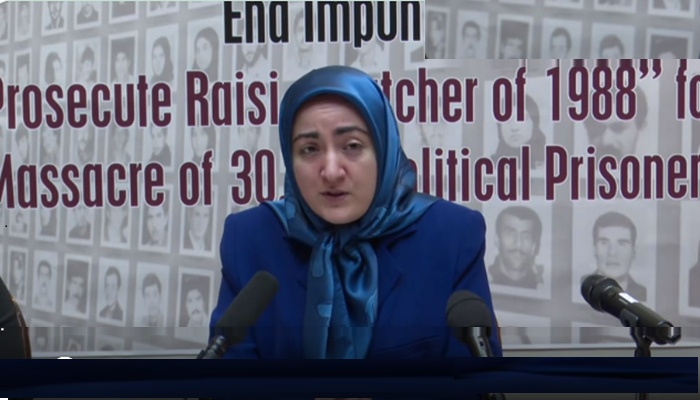
On December 12, a significant press conference was held in Geneva, protesting the United Nations’ decision to invite Iranian President Ebrahim Raisi to the Global Refugee Forum 2023.
The conference spotlighted the voices of survivors from the 1988 massacre of political prisoners in Iran, who are now seeking legal action against President Raisi for crimes against humanity.
The conference’s backdrop is an international campaign signed by 350 dignitaries, expressing outrage at Raisi’s participation and urging his prosecution for past and ongoing crimes against humanity.
Key speakers at the press conference were three plaintiffs who filed a legal complaint against Raisi. Mr. Reza Shamirani, a former inmate of the infamous Evin prison for over a decade, recounted a direct encounter with Raisi during the 1988 death commissions. Joining him were Mr. Ali Zolfaqari, imprisoned for 12 years, and Mrs. Razieh Qodrati, who lost her brother in the 1988 massacre and also suffered imprisonment.
The central message was unequivocal: a regime marked by executions and terrorism sponsorship should not be welcomed at the United Nations. The speakers emphasized the necessity of accountability and justice for the Iranian regime’s crimes against humanity.
Geneva: Witnesses to #1988Massacre in #Iran file legal complaint against Raisi #ProsecuteRaisiNow https://t.co/sSFci78mm9
— NCRI-FAC (@iran_policy) December 12, 2023
Zolal Habibi from the NCRI’s Foreign Affairs Committee hosted the press conference, strongly condemning Raisi’s visit to Switzerland and highlighting the international community’s failure to hold him accountable for ongoing crimes against humanity. She cited instances in Scotland and New York where Raisi’s attendance at international conferences was thwarted due to complaints from Iranian massacre victims.
She raised concerns about the influence of the Islamic Revolutionary Guard Corps (IRGC) in Raisi’s delegation, pointing out the European Parliament’s call for blacklisting the IRGC and recognizing the Quds Force as a terrorist entity.
Reza Shemirani, a Swiss resident, voiced his shock at Raisi being invited by Swiss authorities, despite his notorious history. Shemirani, imprisoned from 1981 to 1990 for supporting the People’s Mojahedin of Iran (PMOI/MEK), expressed his dismay at the contradiction this invitation represents given the dire human rights situation in Iran.

Ms. Habibi also highlighted Raisi’s involvement in the 2019 and 2020 crackdowns on protesters, emphasizing the alarming execution rates in Iran, which include political prisoners, minors, and women.
Ali Zolfaqari, another former political prisoner, reiterated his commitment to prevent Raisi’s entry into Switzerland. He emphasized the urgency to inform the world about Raisi’s past as an executioner and a member of the Death Commission.
Razieh Qodrati, emotionally sharing her experiences of the 1988 massacre, highlighted the role of Raisi in these atrocities. Her personal connection to the events – losing her brother during the massacre – underscores the gravity of the situation.
The press conference in Geneva marks a pivotal moment, as it brings to the forefront the call for justice and accountability for the crimes committed by the Iranian regime, particularly under the leadership of Ebrahim Raisi. The international community’s response to these allegations and the legal actions pursued by the survivors will be closely watched in the days to come.

MEK Iran (follow us on Twitter and Facebook), Maryam Rajavi’s on her site, Twitter & Facebook, NCRI (Twitter & Facebook), and People’s Mojahedin Organization of Iran – MEK IRAN – YouTu
